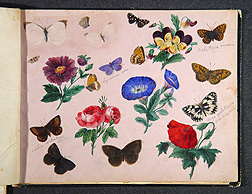This page has been archived and is being provided for reference purposes only. The page is no longer being updated, and therefore, links on the page may be invalid.
|
Read the magazine story to find out more. |
|
|
Entomologist C.V. Riley Featured in Agricultural Library Collection
By Marcia WoodOctober 17, 2005
Graceful drawings of butterflies, moths, caterpillars and plants are among the works of superstar entomologist Charles Valentine Riley, regarded as America's foremost entomologist of the 1800s. Many of Riley's papers and artifacts are preserved at the Agricultural Research Service's National Agricultural Library in Beltsville, Md.
Dozens of letters, some sketchbooks and hundreds of other documents are among the Riley treasures curated by Susan H. Fugate and Sara B. Lee at the library.
|
|
The collection also includes historical artifacts: Riley's roll-top wooden desk with its small drawers and pigeonholes; the elegant medal presented to him by the French government for outsmarting a vineyard scourge; his Zeiss microscope and its snug wooden case, plus more than 1,000 wood-based printing blocks used in illustrating the publications American Entomologist and American Entomologist andBotanist, of which he was an editor.
These papers and artifacts are an important resource for historians, entomologists and others interested not only in Riley’s accomplishments but also in getting a first-hand picture of what life must have been like in the days of Charles Darwin (with whom Riley corresponded), explorer John Wesley Powell (a fellow member of the Cosmos men’s club that Riley helped found in Washington, D.C.), and other notables of that era.
Riley may be best known for his pioneering work with biological control, the still-practiced art and science of using one natural organism to control another, harmful one. In Riley's instance, the targeted pest was cottony cushion scale, a flat-bodied insect that threatened to wipe out southern California orange groves in the 1880s. Riley orchestrated the importing of a natural enemy--vedalia beetles from Australia--to successfully combat the scales.
That accomplishment led to Riley's being regarded as the founder of biological control in America.
A website at https://specialcollections.nal.usda.gov/guide-collections/charles-valentine-riley-collection tells more, as does an article in the October Agricultural Research magazine.
ARS is the U.S. Department of Agriculture's chief in-house scientific research agency.


